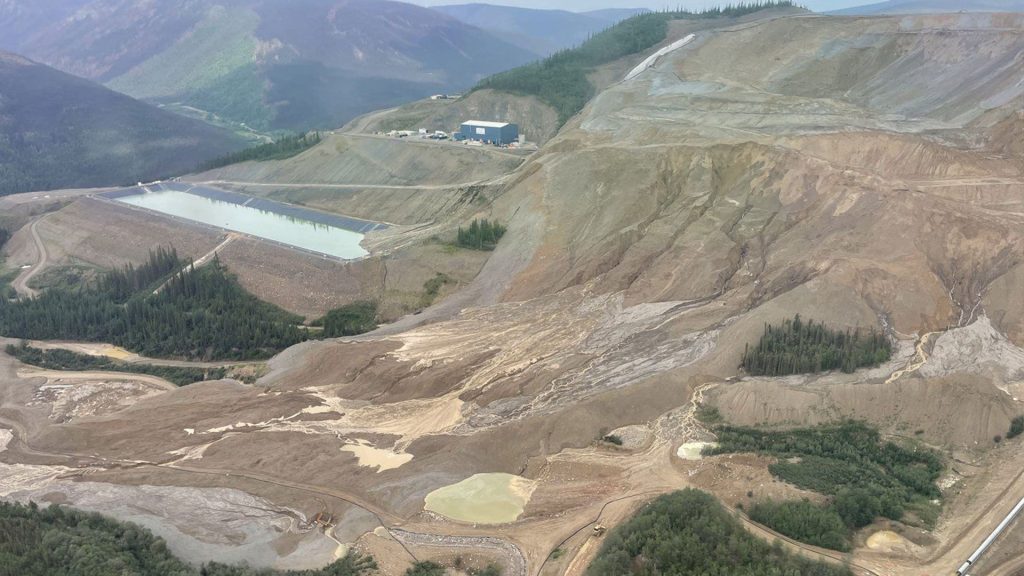
Victoria Gold's Eagle gold mine site north of Mayo, Yukon. Photo: Yukon Government
Yukon’s deputy mining minister says it’s “unfortunate and frankly unhelpful” that the owners of the Eagle Gold mine have been “silent in general” about action to remedy a disastrous ore slide that spilled hundreds of millions of litres of cyanide solution.
Lauren Haney said Victoria Gold had been “doing a lot of work” to treat and divert contaminated water, but it may not be enough, and the Yukon government was contemplating stepping in to “complement and supplement” the company’s work.
She told a briefing on Thursday that officials were “relying heavily” on the advice from technical experts to keep them apprised of the situation at the disaster site, and the territorial government hasn’t ruled out taking on a greater role.
“We are looking at all the scenarios right now, and one of those scenarios is where we would be taking over activities at the site in a more complete way,” she said.
“There’s a lot of complexities there with the company still being on site and again, to the extent we can, we must complement what the company is already doing and supplement where necessary.”
Read more:
Recent spill stirs speculation about future of Yukon mine
Haney said an independent review panel would be appointed to investigate what happened at the mine on June 24, with the government already in contact with “world-class experts.”
“This is similar to what’s done with any mine failure in the world, this type of independent review panel is struck to ultimately get at the heart of what happened,” she said. “And absolutely it’s with a view to lessons learned and implementing that in our legislation as well as our enforcement regulatory practice.”
The government has estimated the ore slide allowed 300 million litres of cyanide solution to escape containment at the mine’s heap leach pad, which uses the chemical to extract gold from ore. Eagle Gold mine is about 500 km north of Whitehorse by road.
Yukon mineral resources director Kelly Constable said the situation at the mine site is in flux, and the company is running out of storage space for contaminated water in the mine’s ponds.
She said Victoria Gold is creating more storage space as a “temporary measure,” pumping contaminated water through the mine’s heap as it tries to buildup additional capacity over the next 10 to 15 days.
Read more:
‘We should learn lessons out of this situation’: Yukon commits to investigating mine leak
Constable said the firm’s water treatment facility is also unable to currently handle the volume of contaminated water, but it’s working on upgrading it while increasing monitoring of the stability of the heap leaching facility.
Victoria Gold hasn’t provided a public update since July 12, saying further information will be provided “as it becomes available.”
The company said then it was uncertain if it would ever resume production or if it had the financial resources to repair damage and fix the environmental impact of the disaster.
The company did not immediately respond to phone and emailed requests for comment Thursday.
Yukon Mines Minister John Streicker told Thursday’s briefing that the Yukon government had sought more information from the Na-Cho Nyak Dun First Nation, whose territory the mine is on, about their call for a mining moratorium on their lands.
“I don’t speak for the First Nation, but I will share our understanding that following the heap leach failure, the First Nation of Na-Cho Nyak Dun does not want any new mineral claims, licenses, exploration, development authorizations or ongoing mining activities on their traditional territory,” Streicker said.
“The Yukon Government is now working to understand rights and obligations under Canadian and territorial law.”










